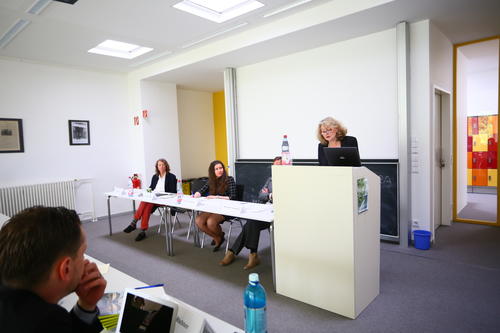Workshop Report on "Comparing Media beyond the Nation State - A German-Russian Workshop on Diversity, Migration and Journalism"
Auf Einladung des Instituts für Publizistik- und Kommunikationswissenschaft (IfPuK) der Freien Universität Berlin fand am 6. Mai 2015 ein öffentlicher Workshop mit Kolleg_innen von der Staatlichen Universität St. Petersburg (SPbU) zum Thema “Comparing Media beyond the Nation State: A German-Russian Workshop on Diversity, Migration and Journalism” statt. Gefördert durch die Staatliche Universität St. Petersburg sowie das Center for International Cooperation der Freien Universität Berlin, konnten sechs Kolleg_innen der SPbU nach Berlin eingeladen werden, mit denen das IfPuK bereits seit 2012 aktiv zusammen arbeitet, u.a. seit 2014 im Double-Degree Master's Program “Global Communication and International Journalism.” Gegenstand des Workshops waren komparative Ansätze zum Themenfeld Migration, Medienwandel und transnationale Öffentlichkeit(en), die in der Forschung und Lehre an beiden Standorten von hohem Interesse sind.
Eingeleitet wurde der Workshop durch Grußworte der Vizepräsidentin der FU Berlin, Prof. Dr. Brigitta Schütt, der Leitenden Direktorin des IfPuK, Prof. Dr. Barbara Pfetsch, der Vize-Direktorin für Internationale Beziehungen der SPbU, Dr. Anna Litvinenko, und der Gastgeberin Prof. Dr. Margreth Lünenborg. Dabei wurde die strategische Partnerschaft der FU und der SPbU betont, wie auch der wissenschaftliche Wert komparativer Ansätze in der Kommunikations- und Medienforschung, die sich bislang vielfach noch an nationalen Bezugsrahmen orientiert. Der Workshop hatte jeweils zwei Panels zu den Themen “Comparing Media beyond the Nation State” und “Negotiating Diversity: Media Discourse and Media Practices”.
Am Vormittag ging es in den Vorträgen um Ansätze komparativer Forschung z.B. am Gegenstand journalistischer Arbeitsweisen in den BRICS-Staaten, der Pressevielfalt in deutsch-sprachigen Regionalzeitungen oder russisch-sprachigen Medien in Deutschland. Dabei wurden auch kontrovers und kritisch Dynamiken der Globalisierung und deren wissenschaftliche Erforschung thematisiert. Im Blick waren ebenso theoretische Konzepte zur komparativen Medienforschung jenseits von Modellen, die überwiegend westlich-demokratische Staaten berücksichtigen. Sehr erfreulich war die rege Beteiligung auch von Studierenden an der Diskussion zu transnationalen Medienentwicklungen.
Am Nachmittag ging es dann in zwei Panels um die Wahrnehmung von Migration in nationalen Medien und um Diskurse über und zwischen Migrant_innen in sozialen Medien über transnationale Identität, Ausgrenzung und Abgrenzung. Deutlich wurde dabei, dass in Russland Migration fast ausschließlich mit Personen aus den zentralasiatischen Republiken assoziiert wird, während in Deutschland vor allem Fragen der Integration und des “Migrationshintergrundes” auf der öffentlichen Agenda stehen. Diese sehr unterschiedlichen Wahrnehmungen von Migration und der oft positiver besetzten Mobilität wurden im Workshop breit diskutiert. Während sich bestimmte Medienentwicklungen, wie auch Mobilität und Migration, als globale Phänomene beschreiben lassen, bleiben die Bewertung und politischen Konsequenzen solcher Phänomene oft einem nationalstaatlichen Rahmen verhaftet. In Fallstudien, u.a. zu Migrant_innen in Deutschland und Nord-Ossetien, wurde deutlich, dass migrantische Identität und Eigenständigkeit sehr von den lokalen Bedingungen und Machtgefügen abhängig ist, die zu den vorgenannten globalen Phänomenen durchaus auch kritisch und (selbst-)reflexiv in Beziehung gesetzt werden müssen.
Über die gemeinsame Diskussion von Forschungsperspektiven und -ergebnissen zeigte sich, dass unterschiedliche analytische und empirische Ansätze zum Themenfeld Migration, Medienwandel und transnationale Öffentlichkeit(en) gewinnbringend zusammengebracht werden können, und dass in St. Petersburg wie Berlin distinkte Forschungsprofile zu diesen Themen existieren. Auf wissenschaftlich hohem Niveau konnte erfolgreich deutlich gemacht werden, wie aus je unterschiedlichen Forschungskontexten heraus Kolleg_innen des Berliner Instituts und des Instituts in St. Petersburg mit Fragen des Medienwandels unter Bedingungen von Gesellschaftswandel, der eine Betrachtung jenseits nationalstaatlicher Konzepte erfordert, befasst sind.
Weiterführende Links zum Workshop:
- School of Journalism and Mass Communications St. Petersburg University bei Facebook (Bilder)
- Fotos von Masha Ivanova
- Artikel von Annika Middeldorf in “Campus leben”
English Version
The workshop on "Comparing Media beyond the Nation State" was co-organized by colleagues from St. Petersburg State University and the Institute for Media and Communication Studies at Freie Universität Berlin. During this one-day event, the lively discussion and varied presentations demonstrated that the subject of migration and media is relevant in both research contexts. There are numerous approaches to the study of migration and media, ranging from the role of ethnic media and media usage in migration contexts, to the representation of migrants and migration in national and social media, and the more global dynamics of mobility and migration that complicate traditional notions of nationhood, state, and identity.
The dimension of conflict between migrant communities, whether mediated or located, and residential or national groups was frequently cited as a source of antagonism but also as initiation of identity processes. Between Germany and Russia, differences in the constitution and role of the public sphere also distinguish the debate of migration and migrants in the public. The Russian debate labels actors from Central Asia and former Soviet Republics as migrants, reserving other terms for gastarbeiter or refugees or migrants from the West. In Germany, by contrast, the debate has for a long time focused on people with a “background in migration” in terms of their integration in German society and has only recently adopted the problem of migration in relation to refugees from central Africa and the Middle East coming to “Fortress Europe” in search of political asylum.
As an overall result of the debate, two distinct fields of research were regarded as important: the representation of migration/migrants in national media or media discourse as opposed to migrants’ own accounts, own modes of organization, own agency in defining communities and its relevance for the constitution of public spheres. More generally, migration needs to be distinguished and put in relation to global processes of mobility and new conceptualizations of political mobilization under conditions of networked, social, and digital media. Thus, migration and global mobilities are seen as current challenges for the constitution of public spheres which are no longer to be understood in a framework of the nationstate.
The organizers thank all participants for their valuable and engaged contributions, as well as the Center for International Cooperation of FU Berlin and St. Petersburg State University for supporting this international workshop. We were also happy to see many students in the Double Degree Master's Program "Global Communication and International Journalism" taking part in the debate.
Further Links:


